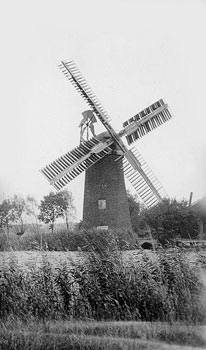
|
Ashby
Oby drainage & sawmill River Bure |
 |
c.1905 |
Oby drainage mill in Ashby was a 4 storey red brick towermill and was built beside the River Bure in the combined parishes of Ashby with Oby. The mill was on the Oby Manor House Estate and belonged to the Wyndeham Cremer family but was tenant farmed by the Wiseman family from before 1836 to after 1937, thus the mill was often known as Wiseman's Mill. The mill was almost certainly built in 1753 and a datestone was incorporated in the tower structure. The sails powered both a scoop wheel and a sawbench that was probably only used for estate work rather than commercial operations.
|
Oby mill is the oldest remaining drainage mill on the Norfolk Broads. |
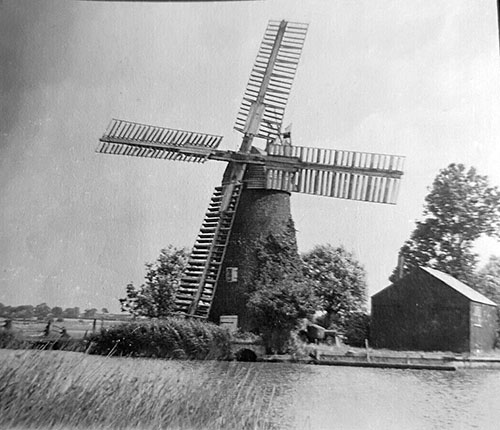 |
c.1919 |
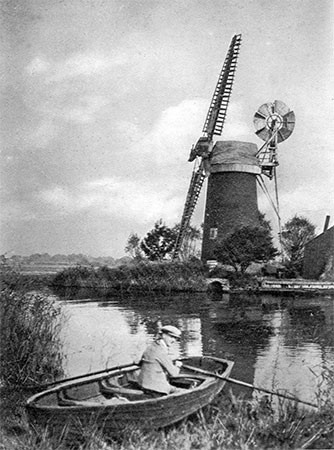 |
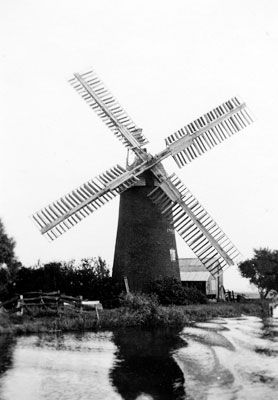 |
c.1925 |
1930 |
The mill used two pairs of patent sails, one pair having 6 bays of 3 shutters with a bay of 2 shutters nearest the canister and was struck via tail pole. The boat shaped cap had a petticoat and held a 6 bladed fan. |
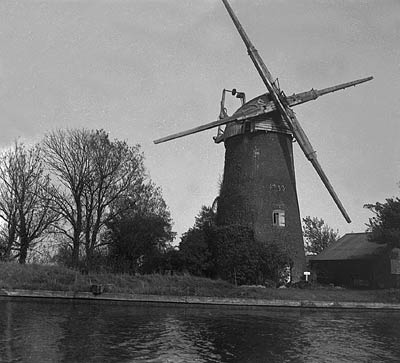 |
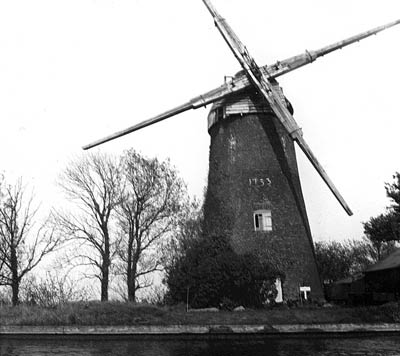 |
c.1935 with intact boat shaped cap |
c.1935 |
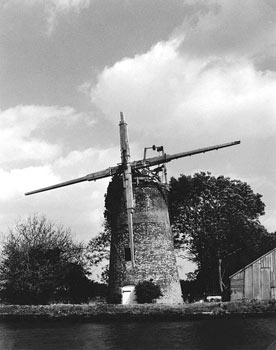 |
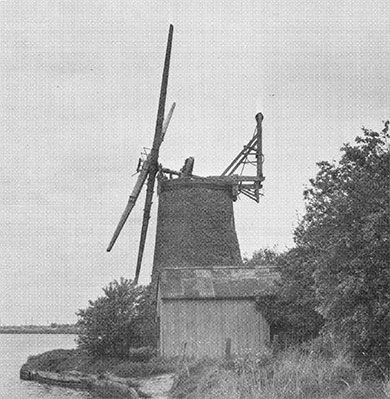 |
c.1960 |
May 1973 |
At some point the top section of the tower was rebuilt.
|
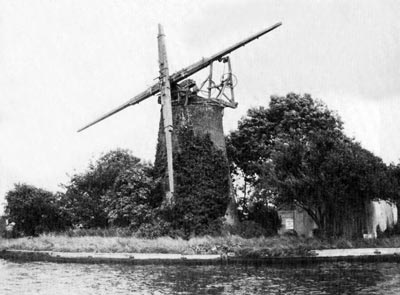 |
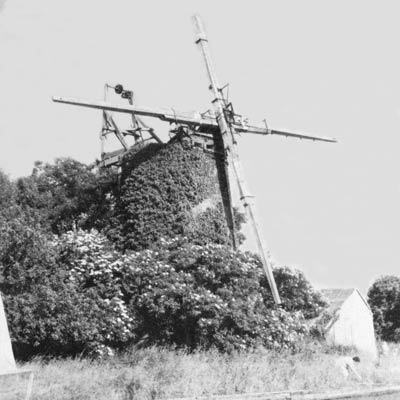 |
June 1985 |
June 1988 |
| OBY near Thurne, Norfolk
|
SEWELL & BRERETON have received instructions from Mrs. T. Wyndham Cremer to Sell by Auction at the Royal Hotel, Norwich on Saturday July 8, 1905 At 3.30 in the Afternoon precisely, all that very desirable |
FREEHOLD PROPERTY |
situate Three Miles from Acle (G.E.R.) and Martham (M. & G.N.Jt.R) Stations and known as the |
MANOR HOUSE ESTATE |
comprising a capital Residence COMMODIOUS AGRICULTURAL BUILDINGS, TWO BRICK and TILE COTTAGES, and 288a. 2r. 37p. of good deep soil Arable, Marsh and Pasture LAND, as now in the occupation of the Executors of the late Mr. A.B. Wiseman at a rental of £275 per annum. MARSHMAN’S COTTAGE and OUTBUILDINGS, BRICK TOWER WINDMILL with a Portable Engine in Shed used as an auxiliary, driving a powerful Turbine and draining in addition to the Marshes of the Farm about 300 acres, the dues from which will be included in the Sales. In Three Lots. Particulars of the Auctioneers, 17 Prince of Wales Road, Norwich or of Messrs. Francis and Back, St. Giles Street, Norwich, Solicitors to the Vendor. Norfolk Chronicle - 10th June 1905 |
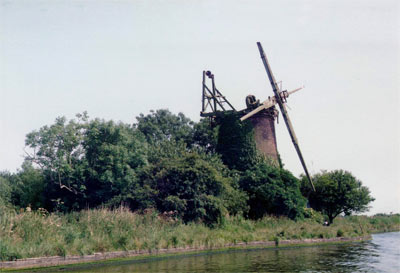 |
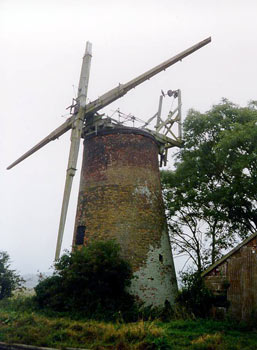 |
c.1992 |
September 1998 |
In 1933 the mill was being run by H. Davey and had been in that family for around 100 years.
|
The mill was also used to power a circular saw bench for estate timber work. An auxiliary engine also drove a turbine to assist with drainage when required. The mill was powered by 4 patent sails and had a boat shaped cap with a petticoat and a 6 bladed fan. Striking was via a chain pole.
|
In 2008 the mill was recorded as being Grade II listed.
|
Memories of Oby Mill - Madge Ward |
Madge Ward was born in Upton in 1920. She lived in a cottage next to the mill until she was about 14 with her two older brothers, Herbert and Maurice. Her father ran and maintained Oby drainage pump and managed the marshes that surrounded it, only really accessible by river. 'Surrounded by marshes with no roads, if you dug down you'd get water, so you couldn't have a well; it was our only means of fresh water. Made in London, the pot used to have charcoal and a sponge in it to clean the water for our drinking water. The water came straight from the dyke. The sponge needed to be cleaned, as the water used to just drip through. It was our drinking water! The dyke water was clear and you could see the bottom of the dyke in those days. You could see all the fish, all the spiders and pike swimming, things have changed so much! Originally there was a lid on the pot and it stood on a stool. My Mother remarried and everything was sold at auction but luckily my husband bought it amongst other a lot of other things. In those days everything was put outside for auctions and unfortunately the lid got broken in the move.' 'My father Harry Davey and my grandfather before him, ran the mill and was probably born at the mill, I'm not sure. My Mother, Violet was brought up as a farmer's daughter on Church farm at Stockton near Beccles. She didn't want to go down the mill, she promised her mother she would only live at the mill for 2 years and then they would move but that became 45 years! She used to row a rowing boat that my father had built up the river from Oby mill, up Upton dyke, with a bike on the back and bike to Norwich get her groceries, bike home again, put the bike on the back and row home. She was a tiny lady not as big as me and she lived to be 93! So hard work will never kill you . it's worry! She was a tough lady, my mother, making butter, keeping ducks, all sorts of things. We had chickens and turkeys at one time; father had cows and we had calves, kept mostly for food but if there were extra eggs we'd take them to the village to be sold and butter. A shop in Acle Street used to buy the butter from Mother. We used to have a dairy and I used to take over the churning of the butter whilst mother got the tea on when I came home from school - Oh that used to make my arms ache! There was a big shed outside that was a carpenters and blacksmiths workshop. My father and his brother Alfred were trained at Erpingham to be a carpenter and a wheelwright so they both had a trade behind them besides running the mill. They were the first in Upton to have bikes and they'd bike to Erpingham on Monday morning and come back on Friday. My father's brother became the builder; he made all the coffins. He built up Upton church tower. It was a ruin, ruined for hundreds of years Money was raised in the village and they built the church tower up as it is now. My grandfather was very thrifty, he owned a lot of houses in Upton, a row of thatched cottages and he built a bungalow on the end for him and my grandmother to live in when they retired. A relation of mine, a young lad has just moved in the bungalow so that's still in the family but the thatched cottages were pulled down, as they were condemned. I was born in Upton because the doctor, Dr Mckelvie from Blofield was frightened of water and he wouldn't go across to the mill for my mother to have me. She had to come up to a cousin in the village, for me to be born. My two brothers were born at Oby mill. An old man came across from Acle backs. He used to come across the marshes in a horse and fly or one of those lovely cart things to my mother when she had my brothers. I went to school at Upton. It took ¾ hour to walk there in all weathers. When the wind was easterly, the river was rough we used to walk near the dykes because it was sheltered, it used to be bitter coming across those marshes. The marshes would flood in those days and the geese would come in and you'd hear them in the mist. A typical day, when I was a child would start with mother or father getting up first and light the fires. We had to cook with a cooking range in the kitchen, and a wall oven. Father would go out and milk the cows. Mother would get us ready for school. We'd put across the river by boat then walk to school, come back again teatime. And then we would chop sticks, get bits and pieces in, feed the chickens; we always had something to do. You played but your play was work. We had a copper house outside where mother did the washing, she had to light the fire. It was hard work for the five of us. We were in and out of the mill all the while. I can hear in my ear now, the sound of that mill working! When the sails were going round, we'd catch hold of the bottom of the sails, dropping off the other side, then running round the mill and having another ride, until my eldest brother got too brave and got hit on the head with a sail. Maurice and I put him on the bench in the engine house. We daren't go and tell mother till she came up and found us! When I was about 10, my brother and I were sitting on the mill hill, watching the boats go by. The mill was working, the sails were turning and a vane came out of the sail and landed about 2ft away from where we were sitting. The vanes were metal and quite big and the speed it was going - it was frightening and potentially very dangerous, we were very lucky it was not worse. It was a hard life, bringing children up, ever so hard but we were self-sufficient. We had flour, 10st at a time, chicken food; everything by big sacks came by wherry - and coal because the mill was a steam engine in those days. There was a quay heading but the wherries couldn't get very close and used a ladder or steps to take the things across, because the side of river was shallow and if they came very close the wherries would get stuck on the mud. Everything was brought in either, by wherry, or by my mother or father rowing a boat. We used to leave a lot of things at the staithe house, we knew the people there very well. People would drop things off there for us, we would collect them and put them in the boat and row it home. We never had an engine of any sort. I used to fish with a bent pin on the end of a piece of string to try to be like my brothers who had proper fishing rods. I never caught anything! Father used to set the eel traps so we used to have big eels occasionally that mother used to skin and lay in salty water for a long while to take away the 'dykey' taste and cook them and we used to eat them. They were lovely if they were well cooked soaked but we never used to eat any of the fresh water fish. We had a marsh and a hay field so we always had a horse and cart come from the farm and cut the hay and stack it up ready for the winter. We also had rabbits to eat. We used to keep apples up on the first floor of the mill; we had apple trees in the garden and had all vegetables we needed. When I was 10, I had a mastoid. I had terrible earache. Mother rowed me to Acle Bridge and went on the bus to Blofield and saw Dr Mckelvie. He said I was seriously ill and I'd got to go straight to hospital. Dr Mckelvie gave mother the money to pay for the bus fare and I went into hospital and I had an operation that afternoon otherwise I'd have died. I was put in the children's block and was in there for three weeks, no children were allowed to see their parents. My cousin Julia waved through the top of the door - she wasn't supposed to. My cousin and I had our tonsils out in Upton in my cousin Julia's front bedroom. My cousin Julia and my mother scrubbed the boards that my uncle had for laying forth the people who died. It was placed in front of the window and covered with a sheet. Two doctors and a nurse took the tonsils out. We had chloroform. I remember sitting up in bed and having this calves foot jelly to soothe the throat. Oh I did hate it! My brothers used to do a lot of sailing. They used to make boats in the workshop, and go sailing in the dingy they'd made themselves. They used to do Meccano and fretwork and make things. They used to walk on stilts. I always remember Father made some for me. I wanted to be just like them. One of my brothers can just remember my father putting a flag on the middle sail when the First World War was over. The vicar used to come and see us once a year he used to bring a lovely calendar. The nearest church was at Thurne. My parents used to sing and they belonged to the Upton choral society. They were educated people I was happy there, I didn't know any different, my brothers, Herbert and Maurice were nine and six years older than me, Herbert was the eldest. They were protective over me. When they left school at 14-15 they were apprenticed to Woods boat builders at Potter Heigham. They would bike backwards and forwards to Potter Heigham every day. On our mill hill we had a water gauge and that used to have something to do with the Ports and Haven people in Yarmouth. Father had to put a graph sheet around its' cylinder and there'd be a little needle with special ink in and as the tides went up and down that would mark a graph. He would set it up and it would run for a month, I think, so they could tell how the tides went in the River Bure at the Mill. There was a fair bit of tidal movement and it could be rough, very rough in bad weather - big billows. Father would put us across the river rather than row. Of course it used to get frozen over in those days. Father would break a wide piece across the river to get the boat across, every morning he'd go out and every night before we went to bed, when it was freezing, breaking it up and putting the ice on the river so we had a way of getting a boat backwards and forwards to get to Upton. The mill dyke had big planks of wood across, and then he'd take two of these planks up and there was a big iron door where he could shut the salt water off from going into the mill dyke and onto the marshes. He used to stand on there and push it open with his legs. Then when the salt water went down again and it was fresh water, he would open it up again and fresh water would go on the banks again. It didn't happen often. It came in more when it the new Acle Bridge was built. The first bridge, when I was a child, had three arches the new one, which was one big arch, somehow it released more of the salt water, so it would reach us. We'd always know because the fish would die and lay on the side of the river, they were fresh water fish there and they couldn't tolerate the salt. Father used to manage the marsh, the dykes and the drains. He use to hire men to do what they called bottifing, it took the whole lot of reeds out of the base of the dykes till they were clear again. He used to look after, count the cattle and feed them on the neighbouring marshes. He also used to do things in the workshop, he used to make wheels, wagon wheels, he was a wheelwright and Uncle Alfred would come down put all the shavings around the wheel and set fire to it, that'd lock the metal around the wheels. He was a man of many trades he used to do bit of thatching, even sheds were thatched, he'd cut the reeds from around the dykes where ever there was a lot of reeds because you could in those days. Father used to catch moles. He'd set traps in the runs to catch the moles. He'd take them home, skin them and pin them out on a board to dry. When he got an accumulation of moleskins, they would be sent to a place in Wisbech and sold. The money he got from selling them bought his Sunday suit. We also had a little dog that'd catch moles. She would pin them. If it was a surface run, she watch them working and then take them and kill them. My father used to paint the sails, scale up the mill and paint them himself but the millwrights used to come out from Ludham. The mill would make a clanking noise when it was working. If the wind got up too strong while father was out working, he'd have to rush back to open the vanes up if the mill was working to stop it blowing over. It was a constant worry, that and the steam engine that was used to pump the water up. He'd be up all night stoking it up. I can picture now his lamp light going up the path to the mill to the engine house to see that it was alright because they were a bit dicey, these steam engines. Then they decided to have diesel engine. He went to Peterborough with Mr Wiseman. It was a long way to go and they bought a new engine, which ran for a number years. Years later Maurice and I went to Fleggburgh Bygones Village and there was the same diesel engine all done up and working. The mill was then powered by diesel and eventually electricity but there wasn't much to do then. My father left just before the war. I was 14 when I moved away from the mill. My father bought a house opposite the chapel and an acre of land, which he gave £100 for. I was thrilled to bits, when I got my bike out of the gate and I could ride it straight away it was marvellous, after having to put it on the boat and row it up the river!' Taken from a conversation between Anne Grand and Madge Ward on 1st February 2008. Anne Grand |
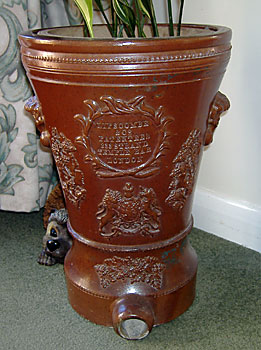 |
Water purifier 1st February 2008 |
If your mantra when property hunting is location, location, location, it certainly ticks all the boxes. Estate agent Trevor Blythe eagerly points out the wonderful broadland countryside and river views and - yes - it certainly has character as the oldest surviving drainage mill on the Broads. Yet the seasoned salesman, who has seen everything from a cold war bunker at Wymondham to a railway signal box at Mattishall go under the hammer, is honest enough to confess the purchase of Oby Mill, near Acle, remains "one for the adventurer". As a building listed as grade two * because of its national importance, Mr Blythe admitted the new owner would face "many, many hoops" to get planning permission to turn it into a home and he thought it an unlikely possibility. Nevertheless, a guide price of £30,000 to £50,000 has failed to deter more than 50 people from across the country expressing interest in the mill, which goes under the hammer at a Tops Auction House sale, at the De Vere Dunston Hall Hotel, Ipswich Road, Norwich, on April 3. Mr Blythe said: "A complete spectrum of people has shown interest. The buyer might well be someone who is willing to take a gamble that if they don't get planning permission straightaway they might next year, or in 20 years." In the meantime, he helpfully suggested that if they were a boat owner they could still pull up on the bank of the River Bure and enjoy the scenery. But Norfolk County Council's heritage and landscape manager, Michael Knights, was yesterday quick to shatter the dreams of any Broads lover still harbouring hopes of turning it into their home. He said: "The couple who currently own it have done nothing with it. This is not a valuable piece of real estate. I have spoken to the Broads Authority and it would never be granted planning permission. "As a grade two * listed building - one of only 100 or so around the county - it would also be a liability. I can see major cracks in the brickwork, and if it is not kept in good repair the planning authority can issue the owner with a repairs notice at any time." Mr Knights is the technical adviser to the Norfolk Windmills Trust and hopes the charity will be in position to successfully bid at the auction, with a view to turning the mill into a working heritage attraction. He said: "There used to be 200 of these iconic mills on the Broads landscape but now there are only 74 left. Oby Mill is the oldest one surviving - there were once copper or brass letters on it saying it was built in 1753." Describing Oby Mill as a "piece of industrial archaeology", he said it reflected the evolution of mills, first using a scoop wheel to move water from the grazing marshes into the river, before switching to a more efficient centrifugal pump. The EDP reported in 1933 how the sails were removed, leaving the mill to be powered by a diesel engine. Mr Knights said the mills were one of the distinctive features that made the Broads so appealing to visitors and he was "passionately concerned these structures should be put back into good heart". If the trust was able to buy the mill, it would cost an estimated £250,000 to put the cap and sails back and restore it. Bryan Reed, chairman of Norfolk Windmills Trust, last night appealed to the public to help make their vision a reality by sending donations to the trust c/o the head of finance at Norfolk County Council, at County Hall. He said: "If we want to do something special we rely on public donations and grants." Stephen Pullinger - Eastern Daily Press - 14th March 2008 |
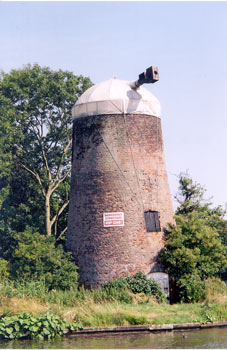 |
4th August 2003 |
The sale of the oldest drainage mill on the Broads was described by the auctioneer as "one for the adventurer" - but it emphatically won the stamp of approval of a Norfolk postman. The sails on the tired-looking mill ceased to be a landmark feature for passing sailors when they were taken down in 1933, its machinery shed long ago fell into dereliction and the former marshman's cottage on site is now little more than a pile of rubble. Norfolk Windmills Trust had been hoping to buy Grade 2* listed Oby Mill, near Acle, to restore it as a working heritage attraction, but at a Tops Auction House sale at the De Vere Dunston Hall Hotel, in Norwich, the charity found itself outbid by Adam Whiting, a local Royal Mail van driver. The guide price was £30,000 to £50,000, and Mr Whiting, 44, of Witton, near Brundall, was willing to pay £41,500 to see off rival bidders for a chance to realise his artistic dream. Since returning from Australia two years ago, where he worked part of the time on historic building renovation, he said he had been looking for a suitably secluded property, a rural retreat where he could indulge his passion for sculpture and carving. Mr Whiting acknowledged that he would have to work closely with the Broads Authority to see what might be possible but he hoped to rebuild the marshman's cottage as a possible home for himself as well as restoring the mill and machinery shed. His plan for the cottage would be to reuse the old bricks on site and create a green dwelling - "living with the environment and not in it" - with solar or wind power and dry composting toilets. Mr Whiting, who would undertake a lot of the restoration himself, said: "I would like to see the mill working again in some way. I have done a lot of travelling and I think I could create something like a travellers' stop." The restoration of the machinery shed might include - subject to Broads Authority agreement - somewhere for light refreshments as well as a spot for walkers to stop and enjoy views of the River Bure. He said: "It won't be a big development. I want something that blends in with the countryside and integrates modern, clean technology with the aesthetics of the old mill." Auctioneer Trevor Blythe said despite massive national interest before the sale there were only three bidders and the price only just crept over its reserve. He had been frank with prospective purchasers that they would face many hoops to get planning permission for a home on the site and it might appeal to someone willing to take a gamble. Stephen Pullinger - Eastern Daily Press - 8th April 2008 |
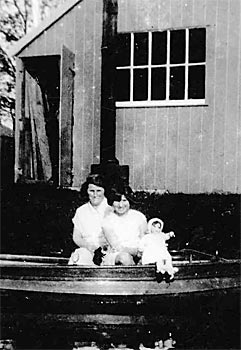 |
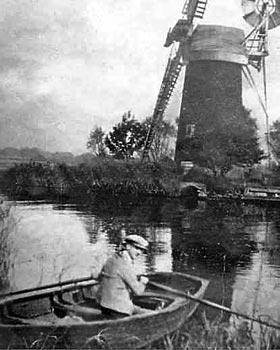 |
Violet Davey and daughter Madge in front of the new engine shed c.1925 |
Herbert Davey in front of mill c.1935 |
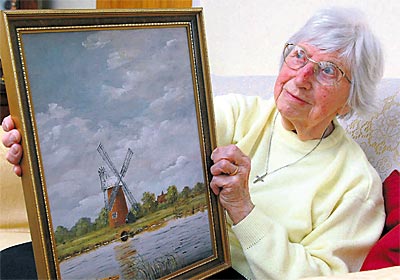 |
Madge Ward April 2008 aged 87 |
| Precious memories of a Broads childhood |
It is an era of Norfolk life long lost -
but not forgotten in the sharp mind of
87-year-old Madge Ward. This week’s EDP report on the sale of the oldest drainage mill on the Broads brought back idyllic childhood memories of rowing to school, spying on otters and catching pike in crystal clear dyke water. Mrs Ward is immensely proud that her father, Harry Davey, was the last marshman at Oby Mill, near Acle, and hopes she lives long enough to see the new owner - Norfolk postman Adam Whiting - restore not only the mill but the chalet bungalow alongside where she grew up with her two brothers in the 1920s and 1930s. Now ensconced in a modern bungalow close to the shops in Acle, Mrs Ward recalls there was no such convenience as she was growing up. She still keeps as a souvenir the old filter they used to purify dyke water for drinking and remembers the complications of life off the beaten track. “I was born in Upton rather than at home because the doctor was scared of the water and would not come down the river on a boat,” she said.“And when my mother, Violet, wanted to go shopping for groceries she would put her bike on the back of our boat and row to Upton dyke before cycling to the shops in Norwich and back.” Little wonder they made themselves as self-sufficient as possible, keeping bees and chickens as well as tending apple trees and a vegetable garden. She said: “I used to come home from school and collect the eggs and we sold them and cream to passing boats. One French couple used to come back on holiday every year and bought our cream.” Mrs Ward said her father had trained as a carpenter and wheelwright at Erpingham, north Norfolk, but had been drawn to follow in the footsteps of his father and grandfather as marshman at Oby, working for landowner Percy Wiseman. “I did not appreciate it at the time but they were marvellous men. It was very hard work but in those days they could turn their hand to nearly anything,” she said. She recalled how, in addition to his duties as custodian of the mill, her father busied himself in his carpentry shed and blacksmith’s workshop - “I used to pump the bellows” - as well as carrying out work on the marshes, clearing dykes and feeding cattle. Mrs Ward said: “The winters used to be harsh. I remember the wicked east wind and when the river was frozen my father used to have to break it open morning and night so he could still row his boat to the other bank so we could get to Upton. People could even skate on the river and my father recounted stories of skating races from Acle bridge to Potter Heigham.” Spring and summer on the river bank more than made up for winter, listening to skylarks and watching swallows build their nests in the mill. She recalled how she and elder brothers Herbert and Maurice - who went on to train as boat builders at Herbert Woods yard in Potter Heigham - would lie over the mill dyke and try to catch pike with a loop of wire. One especially vivid memory is being rowed home from school and catching sight of an otter. Mrs Ward finally left Oby Mill in about 1940 when the family moved to Upton and her father concentrated on carpentry and boat building. While the mill carried on being operated by Mr Wiseman, they were the last residents in the little bungalow and it was eventually pulled down to stop vandals getting a hold. Mrs Ward, whose husband Harry died at the early age of 48, took a variety of jobs to support her son David and daughter Rosemary, finally working at Norwich Union for 15 years. She confessed it was sad to see photographs in the EDP showing the mill uncared for and her past home reduced to rubble but said she was heartened that the new owner - who paid £41,500 at auction - had the“ambition and ideas to do it up." Stephen Pullinger - Eastern Daily Press - 11th April 2008 |
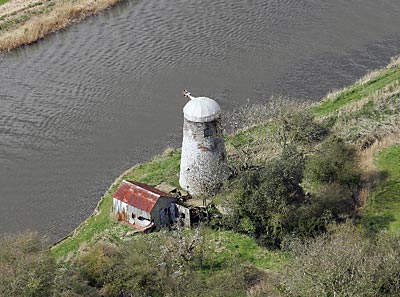 |
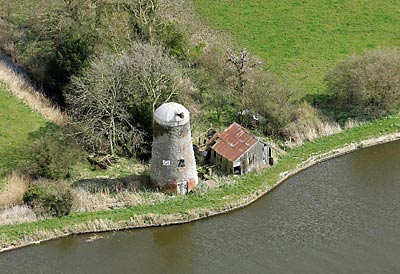 |
9th April 2008 |
9th April 2008 |
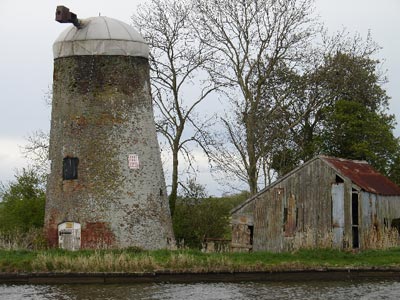 |
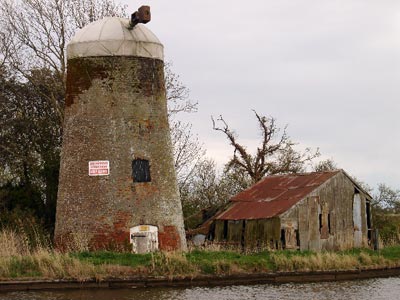 |
24th April 2008 |
24th April 2008 |
Kudos Residential are delighted to offer this rare opportunity to purchase a Grade II Star Listed unconverted former Broadland Drainage Mill. Built in 1753, and featured in the Sunday Times in 2008, the now derelict mill once used to be four storeys tall. The brick mill was located on the Oby Manor House estate which was tenanted by the Wiseman family - and was renamed Wisemans Oby Mill. Its sails powered a drainage wheel as well as a saw bench, presumably used for estate work. An engine-driven turbine was used in addition, when required. Located on the popular Weavers Way walk, the mill, adjacent building and former cottage footings offer huge potential, with other mills converted into B&B accommodation. Access is limited, but rights of way exist with parking. Over 100ft (stms) of river frontage is offered, whilst the plot is approximately 1/3 acre (stms). All potential purchasers should enter the site with caution, and contact the local authority for planning information. |
In the autumn of 2018 the Norwich charity The Missing Kind in conjunction with the Broads Authority and Norwich City College embarked on the restoration of the mill. |
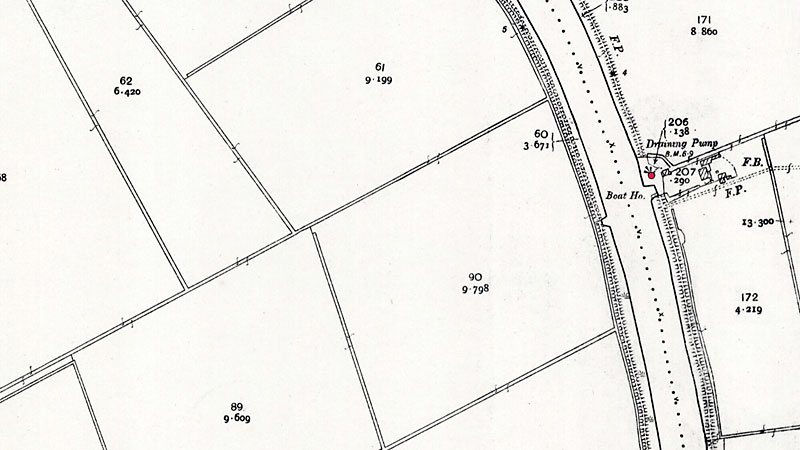 |
|
O. S. Map 1905 Courtesy of NLS map images |
| 1733: Mill built (date set into tower) Faden's map 1797: Obey Drain Mill
1905: A. B. Wiseman died Saturday 8th July 1905: Mill offered for sale by auction at Royal Hotel, Norwich EDP article 1933: Mill sails to be removed leaving the turbine diesel powered 1933: H. Davey c.1984: Cap gone, windshaft, brakewheel, stocks, fan stage and drainage machinery still in situ c.2000: Stocks and remains of fantail frame removed. Shaped tarpaulin tied in place February 2008: Mill advertised for sale by auction April 2008: Mill sold at auction to Adam Whiting, postman for £41,500 March 2014: Mill advertised for sale on third of an acre for £80,000 2018: Mill to be restored by the charity Missing Kind along with the Broads Authority & Norwich City College May 2021: Mill advertised for sale at a guide price of £50,000 |
If you have any memories, anecdotes or photos please let us know and we may be able to use them to update the site. By all means telephone 07836 675369 or
|
| Nat Grid Ref TG 409211380 |
Copyright © Jonathan Neville 2006 |